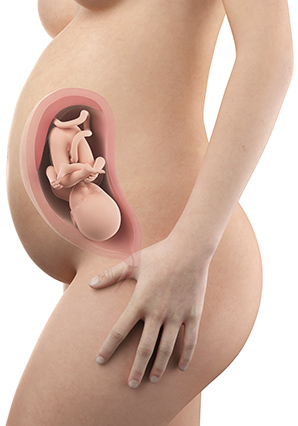Welcome to Week 29! You’re officially in the third trimester now, and just a little over two months away from meeting your baby. At this stage, your body and your baby are both working hard to prepare for the big arrival. If you’ve made it this far, give yourself a gentle pat on the back—you’re doing an amazing job.
Your baby is about the size of a butternut squash, weighing around 2.5 to 3 pounds and measuring close to 15 inches long. Inside your belly, your little one’s muscles and lungs keep developing, and their brain is growing at a fast pace. You might also notice that your baby’s kicks and movements feel stronger or more frequent this week, sometimes even causing you to catch your breath!

This week, many moms notice that their belly feels heavier and their energy levels might dip. You may have some swelling in your feet or ankles, and possibly achy hips or back. These changes are common as you carry more weight and your body gets ready for labor. Try to rest often, put your feet up when you can, and remember—movement like gentle walks or stretches can help ease discomfort.
This is a good time to begin thinking about the practical side of bringing home your baby. You might want to start preparing your hospital bag, reading up on newborn care, or even taking a childbirth class if you haven’t already. It’s also perfectly normal if a few worries or “what-ifs” cross your mind. Lots of moms feel this way, especially first-timers. Don’t hesitate to chat with your provider or a trusted friend about questions that pop up.
- Listen to your body and slow down when you need to.
- Stay hydrated and snack on nutritious foods.
- Share how you’re feeling—emotionally and physically—with dad or support team.
Remember, every pregnancy is unique. Week 29 brings its own mix of excitement, adjustments, and anticipation. Take each day as it comes, and know that you’re not alone on this amazing journey toward motherhood.
Your Baby’s Development This Week
Welcome to week 29! You’re starting your third trimester, and your baby is quickly gearing up for life outside the womb. Each day brings new changes and growth, and you may start to notice your baby’s personality shine through in their movements and patterns. Let’s take a closer look at the exciting milestones happening this week.
By now, your baby is about the size of a butternut squash—measuring around 15 to 16 inches long and weighing between 2.5 and 3 pounds. Over the next weeks, your little one will gain weight even faster, storing up fat for warmth and energy. Much of the big work is done—major organs and body parts are in place—but plenty of fine-tuning is still happening.
- Active Kicks and Wiggles: Your baby has less room in the womb every day, so those flutters and gentle nudges from earlier trimesters might now feel more like strong kicks or stretches. Many moms notice their baby is most active after meals or when they settle down to relax at night. It’s normal to spot a predictable pattern of activity—your baby might be a little acrobat now, turning and reaching as they build strength.
- Sensing the World Around Them: At 29 weeks, your baby’s senses are more developed than ever. Their eyes can open and close, and they’re beginning to react to changes in light outside your belly. You might notice them squirm or play when exposed to bright lights or certain sounds. Some babies even get the hiccups at this stage, which can feel like gentle, rhythmic twitches.
- Brain Power: The brain is growing rapidly right now, forming the grooves and folds that help support complex thinking and memory. Your baby’s brain is busy making billions of new cells. This crucial development paves the way for future learning and sensing the world after birth.
- Lung and Blood Development: Though your baby can’t yet breathe on their own, their lungs are making surfactant—a special substance to help take in their first breaths. The bone marrow is now fully producing red blood cells, which help carry oxygen through the body.
- Building Strength and Reserves: Underneath the skin, more fat is gathering, making your baby’s arms and legs look less wrinkled and more rounded. Muscles and bones are getting stronger, so you may feel some surprisingly powerful kicks!
This is a wonderful time to start connecting with your baby through gentle belly rubs, playing soft music, or talking and singing to them—your voice is soothing and familiar. Paying attention to their movement patterns is important too. If you ever notice a sudden decrease in activity, it’s a good idea to check in with your healthcare provider, just to be safe.
Each week brings your baby closer to meeting you. Celebrate these changes and enjoy this special time—you’re both growing together, and you’re doing an amazing job.
Changes in the Mother’s Body
At 29 weeks, your body is working hard to support your growing baby, and you’re probably feeling some new sensations and changes. It’s completely normal if you feel a mix of excitement and a little discomfort. Many moms find the third trimester both rewarding and challenging, so you’re definitely not alone!
By now, your belly is likely looking and feeling much bigger, and you might notice daily changes in the way you move and how you feel. Your uterus sits high in your abdomen, often halfway between your belly button and your chest. With your baby getting bigger and more active, it’s natural for you to feel both proud and a bit uncomfortable at times.
- Breathlessness: You may notice it’s harder to take a deep breath, especially when climbing stairs or moving quickly. This happens because your growing uterus pushes up against your lungs, giving them less room to expand. Taking things at your own pace, resting when needed, and sitting upright can help.
- Swelling and Fluid Retention: It’s common for your feet, ankles, or even hands to feel puffy. Swelling, also called edema, usually gets worse later in the day or after standing for a long time. Keeping your feet elevated when you rest, wearing supportive shoes, and drinking plenty of water can make a difference.
- Backaches and Joint Pain: Your center of gravity is shifting and pregnancy hormones are relaxing your joints, which may make your back, hips, and legs ache. Gentle stretches, prenatal yoga, and supportive pillows when you sleep can ease these aches. If pain becomes severe or worrisome, don’t hesitate to mention it to your provider.
- Varicose Veins: This is the time when blue or purple veins may appear or become more noticeable, especially on your legs. They develop as your body holds more blood and your uterus adds pressure on your veins. Compression socks can help, and remember, varicose veins usually improve after delivery.
- Frequent Bathroom Breaks: You might find yourself visiting the bathroom more often, especially at night. Your baby and growing uterus are putting extra pressure on your bladder. Try to limit fluids close to bedtime, but be sure to stay hydrated throughout the day.
You may also notice other changes like faster-growing nails, occasional leg cramps, or even mild headaches. Digestion can be slower now, so you might experience more heartburn or constipation. Eating small, frequent meals instead of large ones and choosing high-fiber foods can help a lot.
Interrupted sleep is common at this stage, whether it’s from finding a comfortable position, needing a bathroom break, or your baby practicing kicks and stretches at night. Creating a bedtime routine, using pregnancy pillows, and napping when possible can help your energy levels.
As your belly and breasts grow, you may have itchiness or stretch marks. Using a gentle, fragrance-free moisturizer can soothe your skin. Wearing supportive bras and maternity clothes that don’t dig in can make a big difference in your daily comfort.
It’s normal to feel emotional or anxious as you approach your due date. Whether it’s excitement, nervousness, or even impatience, remember to share how you’re feeling with your partner, friends, or your doctor. You’re doing a wonderful job, and your body’s changes mean your baby is getting ready for the big day ahead!
What to Expect at Your Week 29 Prenatal Checkup
As you reach 29 weeks, your prenatal appointments become even more important for keeping both you and your baby healthy. Each checkup helps your care team track your wellbeing, spot any changes early, and answer questions as your due date gets closer. Here’s what your visit may look like around this time:
- Checking Your Vital Signs: Your healthcare provider will measure your blood pressure and sometimes your temperature. This helps them quickly catch any signs of pregnancy complications, like high blood pressure (which could develop into preeclampsia).
- Measuring Your Baby’s Growth: They will use a simple tape measure to check the distance from your pubic bone up to the top of your uterus (called fundal height). At 29 weeks, this measurement often matches your week of pregnancy, but every mom grows at her own pace. This checks how your baby is growing inside your belly.
- Listening to Your Baby’s Heartbeat: Most providers listen to your baby’s heartbeat at each visit using a small handheld device called a Doppler. Hearing that steady rhythm can be a wonderful reassurance that your baby is doing well.
- Urine Checks: You’ll usually be asked for a urine sample. This test looks for protein or sugar, which can be early signs of things like preeclampsia or diabetes. It’s a quick way to keep tabs on your health between visits.
- Screening for Anemia: A blood test might be done at this point (if not already) to check your iron levels. Iron needs go up later in pregnancy, so this helps spot low levels before they become a problem. If you are low in iron (anemic), your provider may recommend iron-rich foods or supplements.
- Reviewing Your Symptoms and Concerns: Don’t be shy about mentioning anything that feels out of the ordinary—whether it’s swelling, trouble sleeping, heartburn, or emotional ups and downs. Your provider is there to help you find solutions or reassurance. Make a list of questions to bring if you’re worried you might forget.
- Monitoring Baby’s Movement: Your provider may talk to you about keeping track of your baby’s kicks and rolls every day. If you ever notice fewer movements than usual, it’s important to call your provider right away. This is a simple way you can help watch over your baby’s wellbeing from home.
- Looking Ahead: As you move closer to the final weeks, your checkups will likely become more frequent—usually every two weeks. Your provider may talk about upcoming screenings or vaccines, such as the Tdap (to protect your newborn from whooping cough) in the coming weeks.
Remember, there are no “silly” questions during pregnancy—whether it’s about aches and pains, changes in mood, or just wanting reassurance. Staying open and honest with your care team helps everyone support you best through these incredible final months.
Nutritional Tips and Physical Exercise
At 29 weeks, taking care of your body goes a long way in supporting your baby’s healthy growth—and helping you feel your best, too. Here are some fresh ideas and gentle reminders for eating well and moving safely this week:
- Focus on Mini-Meals: As your baby grows and your uterus presses on your stomach, you might find that large meals are uncomfortable. Try eating smaller, more frequent meals throughout the day to keep your energy steady and avoid heartburn.
- Snack Smart: For quick bites, keep easy snacks like sliced apples with nut butter, Greek yogurt, or a handful of trail mix on hand. These provide lasting energy and important nutrients between meals.
- Boost Vitamin C: Add brightly colored fruits like oranges, strawberries, kiwis, or bell peppers to help your body absorb iron better and support your immune system.
- Keep an Eye on Sodium: Swelling is common, but too much salt can make it worse. Choose fresh foods over processed options, and try seasoning meals with herbs and lemon instead of reaching for the salt shaker.
- Treat Yourself to Omega-3s: Omega-3 fatty acids help build your baby’s brain. Snack on walnuts, chia seeds, or enjoy a serving of low-mercury fish like salmon (if that’s part of your diet) once or twice a week.
- Keep a Water Bottle Nearby: Staying hydrated helps with swelling, digestion, and can even reduce headaches. If plain water isn’t appealing, add a slice of lemon or cucumber for flavor.
- Gentle Movement Every Day: Aim for at least 20–30 minutes of light activity, like walking, swimming, or prenatal yoga, most days. Movement helps with swelling, boosts your mood, and can ease aches in your back and hips.
- Strengthen Your Core and Pelvic Floor: Practicing gentle pelvic tilts or Kegel exercises can support your back and help prepare your body for delivery. If you’re unsure how, ask your provider or look for a prenatal fitness class.
- Stretch for Comfort: Stretching your legs, hips, and lower back for a few minutes every day can ease stiffness—especially if you’re spending a lot of time sitting or standing.
- Listen to Your Body: If you feel dizzy, short of breath, or notice swelling that worsens suddenly, pause and rest. It’s okay to modify or skip activities as needed. Always wear supportive shoes during exercise to prevent slips and reduce strain.
- Side-Lying Rest Breaks: Lying on your left side not only encourages good blood flow to your baby but also relieves pressure on your major blood vessels, which can help with swelling and energy levels.
Remember, every day looks a little different—especially now. Celebrate small wins, like trying a new veggie or taking a short walk. The effort you put in truly makes a difference for both you and your growing baby.
Weekly Checklist
Welcome to week 29! As your baby continues to grow and your body changes, here are some helpful steps to keep you feeling your best and make sure everything is on track:
- Pay attention to your baby’s kicks and movements. Choose a time each day to relax and notice those little rolls, kicks, and flutters. If you suddenly feel your baby isn’t moving as much as usual, contact your healthcare provider.
- Make time to rest every day. It’s normal to feel more tired or out of breath as your bump gets bigger. Put your feet up when you can, take short naps, and don’t hesitate to ask for help with daily tasks.
- Keep swelling in check. Elevated legs, comfortable shoes, and avoiding long hours of standing can help with swollen ankles and feet. Drinking plenty of water might seem odd, but it actually helps reduce swelling, too!
- Try gentle stretching or pregnancy yoga. Simple exercises or stretches can ease back, hip, and leg aches—just be careful not to overdo it. If you want guidance, consider joining a prenatal yoga class or finding online videos made for pregnant women.
- Maintain healthy snacks nearby. As your baby’s growth speeds up, you may feel hungry more often. Keep easy foods like yogurt, fruit, nuts, or whole-grain crackers on hand so you can fuel up without reaching for sugary treats.
- Stay regular with fiber and fluids. To prevent constipation and hemorrhoids, try to eat high-fiber foods like whole grains, beans, and vegetables, and remember to sip water throughout the day.
- Organize your next prenatal appointment. If you haven’t already, double-check when your next checkup is and jot down any questions for your provider—such as about birth classes or changes in your symptoms.
- Focus on comfortable sleep habits. Sleeping on your side with a pillow between your knees can support your growing belly and reduce hip discomfort. Finding a bedtime routine, like reading or a warm bath, may help if you’re having trouble sleeping.
- Watch for any new or unusual symptoms. If you notice sudden swelling in your face or hands, persistent headaches, blurry vision, or severe pain, call your healthcare provider promptly—these can be signs your body needs extra attention.
- Connect with your partner or support system. Share your feelings or concerns—pregnancy can be overwhelming, and leaning on loved ones makes a big difference. Even planning a quiet night in or a gentle walk together can be uplifting.
Remember, every pregnancy is unique, and you’re doing an amazing job. Take things one day at a time, keep communicating with your provider, and don’t forget to celebrate how far you’ve come!
When to Call Your Provider
Your peace of mind matters, and it’s always better to reach out if something feels off. While many changes happening now are completely normal, there are certain signs you should never ignore. Contact your healthcare provider right away if you notice any of the following:
- Sudden or Severe Swelling: If your hands, face, or feet suddenly swell much more than usual, or if swelling comes on quickly, let your doctor know, as this can sometimes signal a serious condition.
- Severe Headaches or Vision Changes: Call if you develop a headache that won’t go away, or if you start seeing spots, lose part of your vision, or have trouble focusing.
- Bleeding or Fluid Leaking: If you notice any vaginal bleeding or think you might be leaking fluid (it might feel like your water broke or you’re experiencing a steady trickle), get checked as soon as possible.
- Decreased Baby Movements: If your baby seems much less active than usual or you notice they’re not moving as much, it’s important to contact your provider right away for advice.
- Severe or Constant Abdominal Pain: Ongoing or strong pain in your belly that doesn’t get better could be a sign that needs prompt attention.
- Burning With Urination or Fever: Call if you have a fever, chills, or pain when you use the bathroom, as these may point to an infection that needs treatment.
- Breathing Difficulties: While mild shortness of breath can be normal in late pregnancy, sudden trouble breathing, chest pain, or a racing heartbeat that doesn’t settle should be checked right away.
- Persistent Vomiting: If you are unable to keep any food or liquids down for more than a few hours, reach out for help to avoid dehydration and other complications.
- Early Contractions: If you notice consistent cramping or tightening in your belly (especially if it’s regular or getting closer together) before 37 weeks, or if you experience any signs of preterm labor, call your doctor right away.
- Feeling Unwell or “Not Right”: Trust your instincts—if something feels unusual or you simply feel “off,” it’s always okay to ask for advice.
Your provider is there to support you, and no question or concern is ever too small. When it comes to you and your baby’s health, reaching out—no matter what—means you’re doing the right thing.
Preparations for Baby
With your little one getting bigger every day, week 29 is a great time to start turning excitement into cozy, practical preparations. While you may feel tired or overwhelmed, remember: you don’t need to have everything finished at once. Step by step, your plans will come together beautifully.
- Set up a rest nook for you and baby: Carve out a peaceful spot in your home where you can relax, feed, or simply cuddle with your baby after they arrive. A comfy chair, soft blanket, and a small side table for water or books can make a big difference.
- Start a gentle nesting routine: Gradually wash baby clothes, blankets, and bedding with a sensitive, fragrance-free detergent. Fold and organize them in drawers or baskets so they’re easy to reach. This process can help you feel more connected and ready for your baby.
- Check your essentials: Make a simple list of “must-haves”—like a safe sleep space, diapers, wipes, weather-appropriate outfits, and a car seat. If you feel uncertain, most hospitals won’t let you leave without a properly installed car seat, so it’s worth practicing in advance.
- Pamper yourself: Carrying a growing baby can be exhausting. Try taking warm (not hot) baths, stretching gently, or asking for a foot or back rub. A little self-care helps you recharge and makes everyday tasks more enjoyable.
- Connect with support: This is a great week to chat with other parents or join an online group. Sharing worries or questions with fellow moms, or asking family and friends for help with errands or meals after baby arrives, can bring real comfort.
- Tidy up important paperwork: Double-check insurance details, and keep a small folder for hospital forms, baby’s doctor contacts, or any questions to bring to upcoming appointments. Having these handy can ease your mind later.
- Think about your hospital bag: Begin gathering a few items you’ll want for labor and your brief hospital stay—like comfy clothes, lip balm, phone charger, and a special outfit for baby’s first photos. You don’t need to pack yet, but making a list now can help you feel prepared without any last-minute stress.
Above all, take things slow and trust yourself. You’re already doing a beautiful job preparing. Each small step brings you and your baby closer to a warm, loving welcome.
Citations and References
- The American College of Obstetricians and Gynecologists (ACOG) – Details week-by-week fetal development, maternal changes, and prenatal care for weeks 29–32. Visit Source
- Mayo Clinic – Describes third-trimester fetal growth, weekly maternal symptoms, kick counting, and nutrition advice. Visit Source
- NHS (National Health Service, UK) – Highlights physical symptoms at week 29, fetal activity monitoring, and healthy eating in later pregnancy. Visit Source
- Cleveland Clinic – Offers in-depth week 29 pregnancy development, symptom explanations, and prenatal guidance. Visit Source
- Centers for Disease Control and Prevention (CDC) – Gives general pregnancy health guidelines, including nutrition, prenatal visits, weight management, and key symptoms to monitor. Visit Source
- National Institutes of Health (NIH) – MedlinePlus – Lists week-specific maternal symptoms and fetal milestones, including recommendations for diet and prenatal care. Visit Source
- World Health Organization (WHO) – Recommends prenatal nutrition, hydration, and movement monitoring for a healthy third trimester. Visit Source










